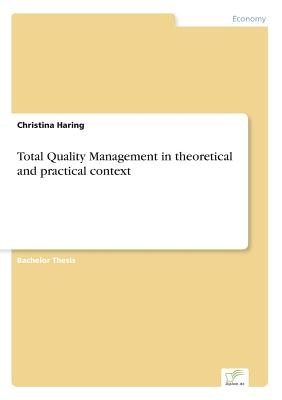
- We will send in 10–14 business days.
- Author: Christina Haring
- Publisher: Diplom.de
- Year: 2004
- Pages: 84
- ISBN-10: 383867779X
- ISBN-13: 9783838677798
- Format: 14.8 x 21 x 0.5 cm, softcover
- Language: English
- SAVE -10% with code: EXTRA
Total Quality Management in theoretical and practical context (e-book) (used book) | bookbook.eu
Reviews
Description
Inhaltsangabe: Abstract: Thesis: To what extend is the implementation of Total Quality encouraged by the European Quality System and how is this theory put into action within a company specific context in order to meet the requirements? The following study focuses on Total Quality Management. It begins with a short overview of the development of quality concepts within the last 50 years. It deals in detail with the fundamental elements of TQM. The particular principles are arranged in a way, which illustrates the mutual supportive interrelationships. After that, the European quality system is explained. It is primarily focused on the European Quality Award and its belonging assessment criteria. Within this framework, the Total Quality implementation is demonstrated by the example of a recent award winner. It is examined in which way and to what extend the theoretical principles of TQM have been applied in order to meet the European guidelines. With reference to the theory, the European evaluation system as well as the company specific application is critically analysed. Introduction: Today's leading organisations are getting aware that it is important to develop a process of continuous improvement in order to deal with the worldwide increasing competition in a successful way. The adaptation to the incessant changing demands of the market and the customer is a problematic task for a company. Under these conditions, top-managers are looking for ways to break up old structures and to take future demands into consideration. One particular approach to improved effectiveness of company performance is the Japanese inspired Total Quality Management (TQM). The fundamental thought is that quality cannot only be seen as a mechanistic process but has to be accepted as a company pervading system. It requires teamwork and an increased development and involvement of employees. Companies, which strive after a high level of quality, see in the customer the key element. Th
EXTRA 10 % discount with code: EXTRA
The promotion ends in 20d.21:46:38
The discount code is valid when purchasing from 10 €. Discounts do not stack.
- Author: Christina Haring
- Publisher: Diplom.de
- Year: 2004
- Pages: 84
- ISBN-10: 383867779X
- ISBN-13: 9783838677798
- Format: 14.8 x 21 x 0.5 cm, softcover
- Language: English English
Inhaltsangabe: Abstract: Thesis: To what extend is the implementation of Total Quality encouraged by the European Quality System and how is this theory put into action within a company specific context in order to meet the requirements? The following study focuses on Total Quality Management. It begins with a short overview of the development of quality concepts within the last 50 years. It deals in detail with the fundamental elements of TQM. The particular principles are arranged in a way, which illustrates the mutual supportive interrelationships. After that, the European quality system is explained. It is primarily focused on the European Quality Award and its belonging assessment criteria. Within this framework, the Total Quality implementation is demonstrated by the example of a recent award winner. It is examined in which way and to what extend the theoretical principles of TQM have been applied in order to meet the European guidelines. With reference to the theory, the European evaluation system as well as the company specific application is critically analysed. Introduction: Today's leading organisations are getting aware that it is important to develop a process of continuous improvement in order to deal with the worldwide increasing competition in a successful way. The adaptation to the incessant changing demands of the market and the customer is a problematic task for a company. Under these conditions, top-managers are looking for ways to break up old structures and to take future demands into consideration. One particular approach to improved effectiveness of company performance is the Japanese inspired Total Quality Management (TQM). The fundamental thought is that quality cannot only be seen as a mechanistic process but has to be accepted as a company pervading system. It requires teamwork and an increased development and involvement of employees. Companies, which strive after a high level of quality, see in the customer the key element. Th


Reviews